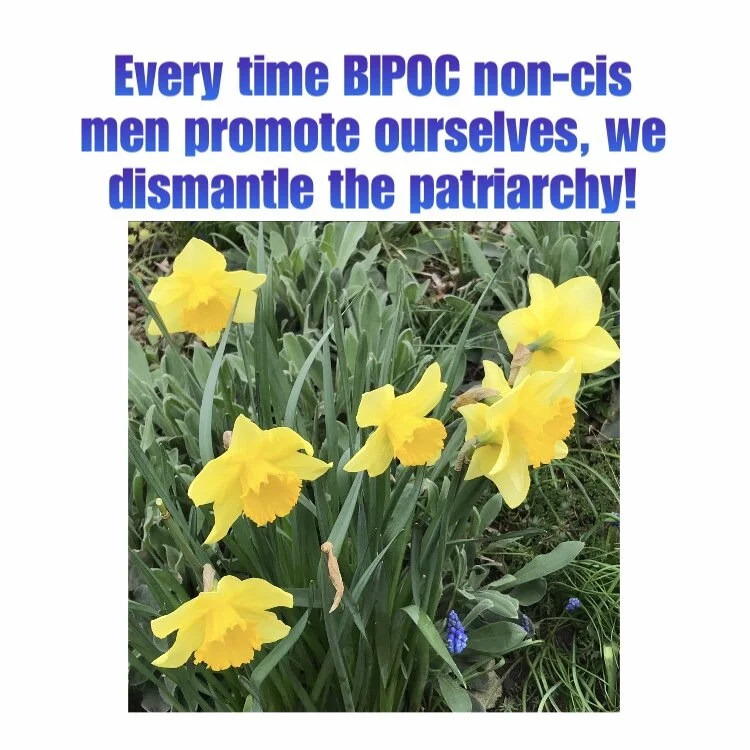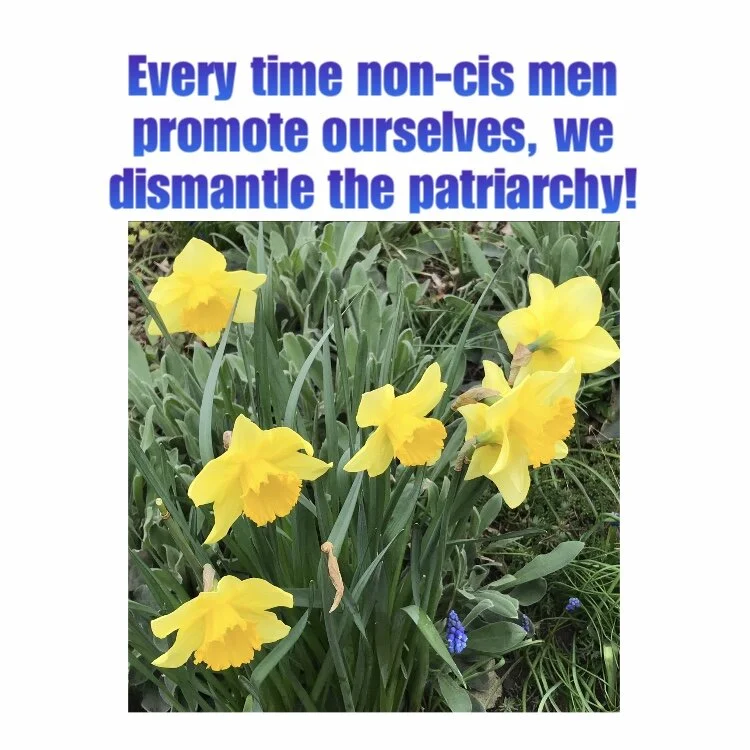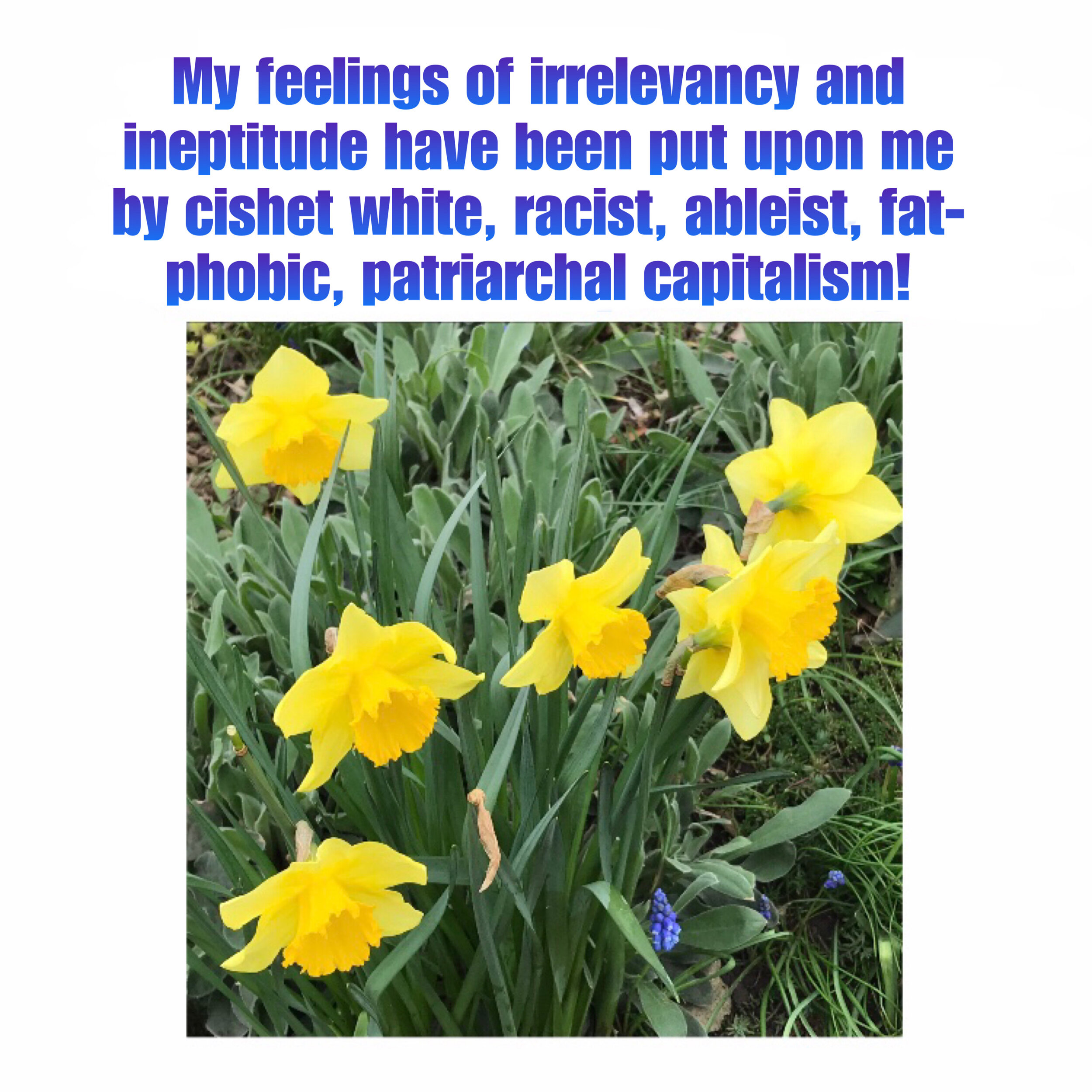NOTES ON JOB SEARCHING - for QTIBIPOC & BIPOC non cis men (and other unconfident folks)
Pathway curving away to the left with green hedges on other side and a sunny blue sky above. Photo by The Mollusc Dimension. (Guernsey, 2019)
I'm feeling very motivated to help others find work. The pandemic has made it harder to earn money, and has also been demotivating for people seeking work. Though I am not a job search professional, I have experienced job searches, been an employee, adapted my CV multiple times over several decades. I also occasionally hire freelancers. People often tell me that my ideas have helped them see things differently, so I thought I would share some notes.
You're welcome to SCROLL past this and jump straight to Section 8 - My ideas about finding work! Or, you may find the background information sparks some ideas. This advice isn't for everyone. Please check out the Disclaimer below the article and A bit more about me.
1. What do I know and why listen to me?
Since I was a teenager, I have been employed at least 9 different customer service jobs in catering and administration as a freelance illustrator and animator for clients since 2007 and taught music to children and adults for over fifteen years. I was only fired once, although arguably I left at the same time, and believe that I left my other posts on good terms. These days, I am fortunate to be self-employed as an artist and music teacher. Over the years, I have also volunteered in several “official” roles, including press and publicity, graphic design, event co-running and event stewarding. All these experiences – good and bad have shaped my ideas on work. My job-seeking days ended a while back, and I am not too well versed in the practicalities of job searching – which job sites to look for. However, I have been working hard to explore the idea of mindset (my own) and as a mould-breaker, I am keen to share my ideas because I am familiar with the idea of resentment and experience mental health issues.
Eight grey, speckled rocks balances in a column with larger ones at the bottom, and smaller ones at the top. The lowest one is only partly visible. It is sunny. (Photo from Unsplash).
2. Reframing Reluctance to Find Work as Seeking Wholeness
Capitalism makes us its tools and many of us need to recover and rest. We deserve to recover and to rest. We are not lazy for not wanting to work and instead to reclaim stolen lives, time and our very bodies from labour. I begin the search for work with the acknowledgement things are bad and sad, and the idea of work and seeking it is painful and fraught with resentment and the fears and anxiety of getting embroiled with organisations that do not value us as whole people.
There have been many people who have influenced me but if I may mention a few particular people: Anna Chan who posted about the pain of not being welcomed as a whole person. As an LGBTIQA+ person, I can relate strongly to her expressed pain of not having aspects of me accepted in my work.
Ideally, work welcomes all parts of us. But some people accept that to pay bills, the work may not be our ideal job. If you do not have a family to support you, you may have no option but to seek work. It may even turn out that the job can help you meet people or acquire more skills and experience in the direction of your dreams.
Daytime desert scene with yellow arrow road sign pointing to the left and the right. Mountains in the distance. (Photo from Unsplash).
3. Socialised limitations placed on oppressed groups create extra hurdles
People who are BIPOC, assigned female at birth, working-class, disabled and/or a combination of these may face confidence issues in imagining themselves in job roles that a less-qualified cishet white middle-class man might apply for. As a queer, trans, AFAB British-born Chinese person, I hesitate to apply for roles and to put myself forward because I am socialised to NOT do so. I found that my awareness and acceptance of my social conditioning is an important first step towards achieving my dreams.
The back of someone in snow gear with skis on their back climbing up a big snowy mountain. (Photo from Unsplash).
4. The conditions of usefulness
On being QTIBIPOC and reclaiming "usefulness" as motivation for job seeking. Here's an observation I made recently. If I have a useful object in my home, if it is in a place where I will not need to use it, it may never get used.
“Every time BIPOC non-cis men promote ourselves, we dismantle the patriarchy!” Six daffodils and some grape hyacinths. Photo by The Mollusc Dimension.
“Every time non-cis men promote ourselves, we dismantle the patriarchy!” Six daffodils and some grape hyacinths. Photo by The Mollusc Dimension.
5. There are jobs. But people don't get them because they don't REALLY want them
At a D&AD conference many years ago, I heard this shocking idea from a speaker (can't remember who it was!) Now, the chances are, it was a cishet white man who said it. And it could be construed as ableist. However, I find it relates to me. I will give you an example. In 2019, I made a debut album. To this day, it has only really had ONE official review. (LINK) The reason was I refused to make a press kit and didn't tell any music press about it. I have good reasons why, but the fact is, I do get depressed because deep down, it makes me feel that my music is unworthy of being reviewed. But it was also partly my own doing.
Likewise, there may be jobs that you can do, including some you might not yet have considered, and that you would enjoy.
I heard about this person who went knocking on doors in a rich neighbourhood asking people how they made their money. Now I don't suggest you do that, especially in a pandemic. And it's probably not safe. But the idea is that they were determined enough to face the potential embarrassment of letting strangers know they were job hunting and wanted to know what they knew. There is so much shame attached to not knowing that we can be afraid to ask for help, afraid to ask how we can improve and to understand that while we may not have the choices we want, we might have one or two choices that we had not considered.
Nine table-top game dice and two counters on a game board. Some are very blurry. (Photo from Unsplash).
6. Selling work/ setting up a new business
I think there is a big need for tech-savvy facilitators who have emotional intelligence. The performing arts industry has taken a hit not because no one wants to see shows anymore, but because physical venues weren't safe. As a QTIPOC, I have had good experiences with tech facilitators for live events. I sense that performance artists – existing contacts, local, further afield, could be interested in planning events that involve paying a technician/ facilitator who sensitive to performer anxiety, reliable and understands how platforms work.
If you can find people who need help and you can offer them what they need, I think there are people with money who will keen to pay you.
Intersectional matters can make it harder to set up a new business or to grow it. Every effort that people with intersectional backgrounds make to promote their business sends a message out to other people with intersectional backgrounds to have confidence and believe that it's worth it to reach in the direction of our dreams.
I was inspired by hearing white artists talking about successfully selling art during the pandemic that emotionally resonated with people – whether it was funny or sad or both. Now, white privilege is a part of success, but I wonder to myself, what if I could harness that confidence? What if I could reclaim my confidence?
I'm not saying it's easy but I am sometimes intrigued by the idea of curiosity. This has come about by trying out improv comedy. When I pretend to be different people, I can feel my brain doing different things.
The sun is either setting or rising. Fields, mountain and sky in warm, nostalgic colours (brown, orange, red and turquoise skies). (Photo from Unsplash).
7. A few important points
Always read the contract carefully and if possible, ask someone experienced to go through it with you (e.g. don't sign up for 15 years if that's not what you want!).
A pair of glasses on top of paperwork that could be a contract. (Photo from Unsplash).
Ask to see the contract. Ask questions about the contract. Once I applied for an illustrator job at a medium well-known greetings card and stationery company. At one point it was made clear to me that I wouldn't be allowed to continue freelancing in case there was an overlap of designs and this would affect their ownership of the designs I would produce for them. When I expressed that I wasn't happy with this, the interviewer said the interview should end there, so I picked up my portfolio and left. I felt shocked but it was better to find out then. I went on to freelance as an illustrator for clients from small business owners to a local council, a mobile phone company and an animation production team.
8. IDEAS ABOUT FINDING WORK!
Aside from looking at job search websites for jobs that you can see yourself doing, these are some approaches that I have been trying.
About sixteen colourful bathing huts at an angle going into the distance, on a beach with sand so pale it looks like snow. A few people standing and talking at a distance. (Photo from Unsplash).
a) Apply like a middle-class white, able-bodied guy (Neil Patel is not a white guy but he says write 100 letters and get 2 replies.) I don't mean take a photo of a friend who is a white guy and send that with your application. I mean white, middle-class men are socialised to go for what they want. A way that irritation provokes me to action is by comparing my level of moral integrity and my intersectional knowledge(s) to famous white cis men in powerful positions. Like Toni Morrison, I know I have the moral high ground. Even though I find this utterly depressing, the resulting rage can also lead to me doing my thing with more determination.
Sustainable working practices (flexibility from employers, safe(r) work conditions, support for work stress, support for childcare and health) are things you deserve. People (often women) may hold back from applying for jobs that offer better terms. I’m not saying it’s easy to do it, as it can be very ingrained, but building the awareness of where this limitation comes from, has helped me take tiny steps towards changing my actions.
A top view of a pair of white trainers is partly visible (as if the photographer is wearing them), on a richly-hued, red carpet. (Photo from Unsplash).
b) WORK on and SHARE your CV Find friends/ a professional to work on or share your CV with. Ask for feedback. I think if you have been out of work for a while, it could be an investment to seek professional advice.
Seven brightly coloured paper craft flowers with cotton buds for a stamen, standing amongst grass/ greenery. (Photo from Unsplash).
Maybe you didn’t imagine it, but when you share your CV with your friend, they’ll get to appreciate more about you! Or if you seek help from a professional, you might discover some really useful tips.
c) Tell people you're looking for work. Make an advert. (see share your CV). After looking at job adverts, create an advert for yourself and share it on social media. It may be embarrassing, but there are two useful outcomes. Someone who sees it might have work for you, or be able to put you in touch with someone who does. Your contacts will either discover or be reminded of what skills you would like to offer.
A seagull stands on a blue painted wooden post by the sea with an open mouth. The sea is an icy blue colour and the sky is very light blue. (Photo from Unsplash).
Tell people that you’re looking for your work!
d) What might you be willing to offer people? What things do you know? Think outside the box. You do not have to drop your standards. Avoid unethical work situations at all costs. This is not a judgement on people who have decided to take on unethical work to survive.
Food by Frost is a start-up company run by two sisters who were experiencing mental health issues. They decided they would LOVE to cook for people. They started a food company. I have tried their food. It's delicious and I can't wait to try it again!
e) Reach out - Who have you worked for in the past that you enjoyed working with? Can you reach out?
f) Use Linked In – My friend told me that the good thing about Linked In, is that your CV is matched on skills and experience and potentially cuts out gender or race based prejudice. Another thing my friend said was that once they started looking at jobs that they might previously not have considered, Linked In started showing them more of these jobs. They had taught the algorithm to help them.
Put your CV on there and search for jobs.
Use the opportunity to reconnect with people you’ve had positive work experiences with.
A mass of brightly coloured cables (green, orange, blue, pink, yellow, red, white, burgundy) plugged into ports in the back of a unit. (Photo from Unsplash).
A FEW COMMENTS ON CONNECTING/ RECONNECTING
It can be really hard to be interested in other people’s career successes if you are going through a bad patch, or have other negative experiences and thoughts about work.
However, for myself, I find that if I can tap into my sense of curiosity, it helps me get out of my head, I’ll nearly always find out something I didn’t know before and it might give me something to talk about (useful as I’m can be socially awkward!).
What is it like doing your job?
What is the work environment like?
What do these job titles mean?
What does this company do?
How did the company form?
Speaking from the perspective of someone who is more interested in small companies, grassroots, small businesses, individual business owners etc, there is a part of me that feels like it’s anathema to even spend time engaging with corporate stories. This includes strategies which might be associated with corporate work - researching things like SEO, applying for jobs that you feel under qualified for, and networking.
If we are not cishet, white, able-bodied men, or even just less confident people of any gender, we are shamed into wanting to do more than survive. We are shamed pretty much whatever we do - whether we fail, or succeed or do something differently or better, someone - often from our own families will be poised waiting to make us feel bad. They observed through our search for liberation that we were their shadow self, and though we will be free of them, they pursue us because they want to be free of us too. Our success haunts them. And so, we will probably never really be free of scrutiny and fear. So the only thing is to feel the fear and do it anyway. (That’s not mine, I read it in a teacher training book for jazz piano).
A squirrel pokes their head out from behind a tree trunk. Behind them, there is dappled sunlight from the tree. (Photo from Unsplash).
Me being curious…
g) What would you say to yourself if you were your friend?
This brings us back to Idea 1: Apply like a middle-class white, able-bodied guy. Look for jobs that look amazing but you don't think you're quite qualified for. I once read that cis men apply for a job if they think they are 30% capable of doing it. Of course, we don't want to be unethical but you might find that there are strong reasons why you should be doing that job (for example Equalities and Diversity). If you can convince the interviewer, you may receive additional support and possibly training.
My feelings of irrelevancy and ineptitude have been put upon me by cishet, white, racist, ableist, fat-phobic, patriarchal capitalism! Six daffodils and some grape hyacinths. Photo by The Mollusc Dimension.
Conclusion
Years ago, I heard was inspired by hearing a concert pianist say something like, “If I just connect with ONE person in the audience, I have done my work well.”
This is why I wrote this.
Dreamers (often) need money to eat, pay the bills and pay for things. I want you to find amazing or at least good opportunities and amazing or at least good people and the money to pay bills and make your life easier.
Turquoise sky, lenticular clouds, magical snowy mountains and yellow field. (Photo from Unsplash).
Disclaimer
These are my opinions. It is intended to be an offering from me and a sharing from me based on my experiences, observations and points that I hope some people might find useful. Please feel free to choose to consider, try, modify, improve, or choose to ignore!
If you disagree strongly and have the capacity to do so, it would be interesting to hear from you and/or you may even feel moved to write your own article about your own experiences and ideas regarding job searching.
A bit more about me
As a British-born Chinese queer, trans person with PTSD and mental health issues. I am torn between raising my public profile as a hidden artist and moving towards recovery (keeping a low profile, making art and music for self and community care, processing). My mental health affects my physical health significantly. That said, on the whole, I benefit from being mostly able-bodied, colorism (I am a light-skinned East Asian person).
I have received higher education and was raised middle class by parents who immigrated to the UK from Hong Kong and experienced levels of poverty and social disadvantage as children.
My parents had high expectations of me professionally, but this was limited by their idea of what a suitable profession for me would be, and also shaped by their own career aspirations. They had low expectations that the world would welcome my creativity and this was partly due to a lack of (access to) knowledge about the creative industry and its cultural value, which I see as being impacted by having been brought up in British colonised Hong Kong.
- creativity
- mental health
- art
- writing
- storytelling
- LGBTIQ
- performance
- trans
- music
- comics
- DIY culture
- video
- songwriting
- decoloniseeducation
- composing
- queerculture
- intersectional feminism
- photography
- poetry
- racism
- culture
- film
- neurodivergent artist
- teaching
- ESEA
- books
- asian
- britishcolonialism
- learning
- trauma
- family
- comedy
- employment
- animation
- interview
- physical health
- transcript
- grief
- higher education
- motivation
- freelancing
- language
- politics
- science
- tv
















